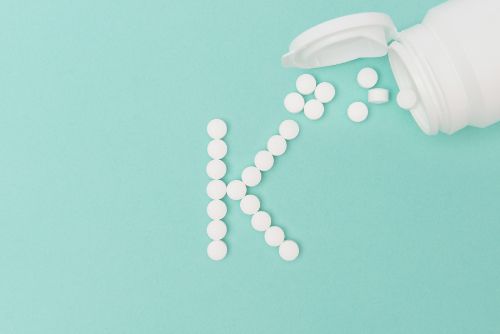NattoPharma Leads Charge to Establish RDI for Vitamin K2
NattoPharma is looking to harness its extensive body of research showing vitamin K2’s heart- and bone-health benefits, as well as establishing clinical biomarkers to demonstrate the consequences of vitamin K2 deficiency, with the hope of one day seeing the creation of a Recommended Daily Intake (RDI) value for K2.
Photo © Shutterstock.com/photographyfirm

Vitamin K2 manufacturer NattoPharma (Oslo, Norway) and its research partners say they are leading the charge to establish an official Recommended Daily Intake (RDI) value for vitamin K2. As part of their plan to hopefully convince the U.S. National Institutes of Health Institute of Medicine (IOM) to one day officially establish an RDI for K2, NattoPharma says the company, as well as its research partners, will now focus even more intensively on building the body of research showing vitamin K2’s heart- and bone-health benefits, as well as establishing clinical biomarkers to demonstrate the consequences of vitamin K2 deficiency. According to the company, vitamin K2 deficiency has been linked to cardiovascular calcification and increased risk of bone fractures.
Katarzyna Maresz, PhD, president of vitamin K research consortium the International Science and Health Foundation (ISHF), said that establishing an RDI for vitamin K2 is important because as much as 97% of the Western population may be deficient in vitamin K2.
“Establishing an RDI is an important step in educating the public about their absolute dietary need, providing them much-needed direction,” she said. ISHF is a research consortium responsible for the educational portal VitaminK2.org, which was developed to educate consumers and healthcare practitioners about vitamin K2 deficiency, as well as its potential health benefits.
In a press release from NattoPharma, Maresz stated that the first step towards establishing an RDI is to establish a biomarker or clinical endpoint that demonstrates the consequences of inadequate vitamin K2 intake. “Scientific knowledge has changed a lot recently, yet there is still a lack of suitable biomarkers or clinical endpoints that can be used to determine vitamin K2 requirements among adults,” Maresz explained.
To that end, a group of researchers as Maastricht University, led by Leon Schurgers, PhD, professor of biochemistry of vascular calcification at the Cardiovascular Research Institute at Maastricht University (Maastricht, The Netherlands), will spearhead the research process for further demonstrating the importance of vitamin K2 for heart health. Maastricht University has worked with NattoPharma on the company’s branded MenaQ7 vitamin K2 ingredient since 2004. According to NattoPharma, the previous research conducted by Maastricht has been recognized in many peer-reviewed papers and has resulted in a number of research grants.
Some of the existing studies conducted by NattoPharma in partnership with Maastricht have shown that vitamin K2 supplementation not only protects against cardiovascular calcification in adults, but it also supports bone health in adults and in children, as well. For example, at April’s The World Congress on Osteoporosis, Osteoarthritis, and Musculoskeletal Diseases conference, NattoPharma presented its latest research on vitamin K2 for children’s bone health. That study linked vitamin K2 deficiency to increased risk of bone fracture in children. Kate Quackenbush, director of communications, NattoPharma USA, told Nutritional Outlook that the company has been studying K2 for children’s health for some time now. Based on those studies, she said, children are the most deficient in and in need of adequate vitamin K2, because children’s bones contain 8-10 times more inactive osteocalcin, a noncollagenous protein hormone found in bone and dentin, than adults’ bones do. In addition, she said, the company’s research has shown that a daily dosage of 45 mcg vitamin K2 as Mena Q7 vitamin K2 successfully activated osteocalcin. The study is currently in the peer-review process and is pending publication.
Quackenbush said that the company’s recent study on k2 and children’s bone health is significant because it provides yet another case for adequate vitamin K2 for kids’ bone health. The results are also significant, she said, because they were presented at an international bone health conference to the medical community. Quackenbush quotes Hogne Vik, PhD, NattoPharma’s chief medical officer, as saying, "having K2 discussed at this conference from a bone-health perspective, while the medical community is also initiating studies to examine K2 as a potential cardiovascular therapy, shows we are making strides in overcoming this hurdle."
In 2017, NattoPharma was awarded the EU Horizon 2020 research grant for vitamin K2 research. The company plans to use those funds to host PhD students and educate them about the food and supplement industry, and the RDI values set by FDA and the European Food Safety Authority (EFSA). “These [PhD students] will utilize this knowledge as they conduct a comprehensive literature review elucidating the data for K2’s bone and cardiovascular benefits,” the company said. “This cogent argument will work towards the efforts of petitioning for RDIs.”
But even with the research community on board, convincing the government to embrace a new RDI for vitamin K2 is a long and difficult process. Eric Anderson, senior vice president, global marketing and business development, NattoPharma, said in a press release that the company’s almost 20 years of research with Maastricht University has helped to build a body of support for a vitamin K2 RDI. “Now it is time to lead the way ensuring that a global recommendation exists so we can ensure vitamin K2 is adequately attained for the betterment of the world population-men and women, adults and children,” he said.
Also read:
Dietary Supplements and Biomarkers: What Constitutes Evidence?
Vitamin K2 Intake May Be Associated with Reduced Risk of Coronary Heart Disease
Vitamin K2 May Protect Against Cardiovascular Muscle Damage from Calcification
Vitamin K2 May Help Inhibit Vascular Calcification, Scientific Review Suggests










